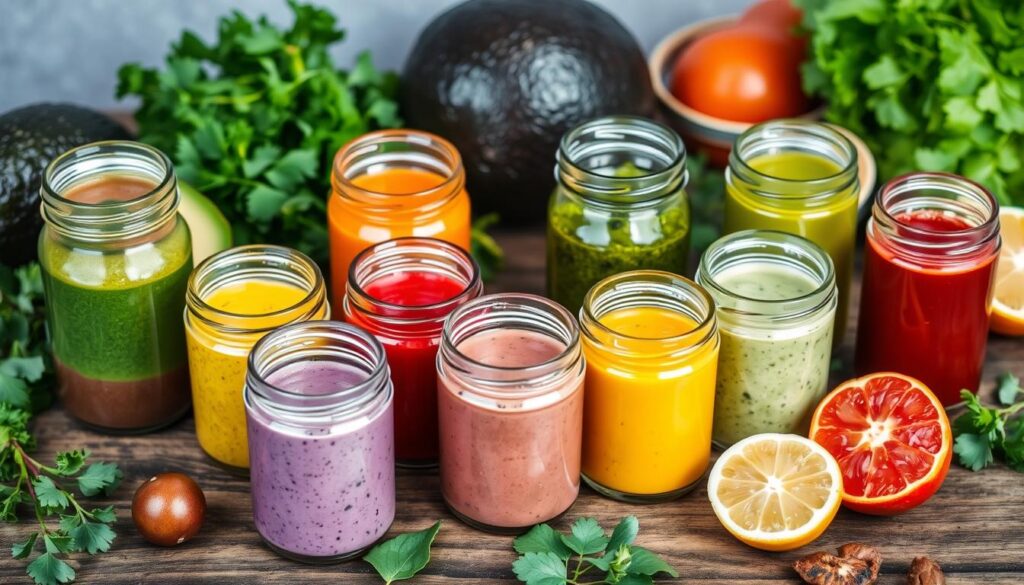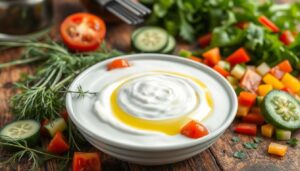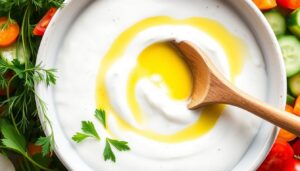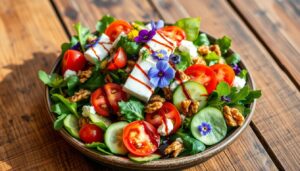I’m excited to share my love for vegan salad dressing recipes with you. Making your own at home is a game-changer. It adds flavor to your meals and makes salads better.
We’ll cover many vegan salad dressing recipes. From classic vinaigrettes to creamy ranch, there’s something for everyone. This guide is great for anyone wanting to make their salads more exciting.
Introduction to Vegan Salad Dressings
In this article, we’ll explore vegan salad dressing recipes. You’ll learn how to make healthy dressings at home. We’ll use plant-based ingredients and easy steps, so you can make your own dressings quickly.
Table of Contents
Why I Switched to Making My Own Vegan Salad Dressings
Making my own vegan salad dressings has changed my health and taste for the better. Store-bought dressings often have preservatives, added sugars, and unhealthy oils. These can ruin the health benefits of a salad. By making my own, I control what goes into it.
One big plus is avoiding unhealthy oils and added sugars. Many store-bought dressings are high in oil, which is bad for health. Making my own no oil salad dressing means I get a healthy, tasty option. Plus, I can make a vegan salad dressing without animal products.
Benefits of making my own vegan salad dressings include:
- Control over ingredients
- Avoidance of unhealthy oils and added sugars
- Customization of flavors and textures
- Cost-effective
Making my own vegan salad dressings has been a smart choice for my health. I can enjoy tasty, healthy salads without the bad stuff in store-bought dressings. Whether it’s a no oil salad dressing or a vegan salad dressing, I know I’m getting the best.
Essential Ingredients for Vegan Salad Dressing Recipes
Making vegan salad dressings requires the right ingredients. A tasty oil free salad dressing is just as good as the traditional kind. Start by stocking your pantry with key ingredients.
A plant based salad dressing has plant-based oils, natural sweeteners, herbs, spices, and emulsifiers. Let’s explore each part:
Plant-Based Oils and Alternatives
Use olive, avocado, or grapeseed oil for your dressing. Nut butters or seed butters add creaminess.
Natural Sweeteners
Maple syrup, dates, and coconut sugar sweeten your dressing. They avoid refined sugars.
Herbs and Spices
Basil, oregano, and thyme add flavor. Garlic, ginger, and turmeric give it a kick.
Emulsifiers and Thickeners
Lemon juice or vinegar mix oil and water. Tapioca starch or arrowroot powder thicken your dressing.
With these ingredients, you can make many tasty oil free salad dressing and plant based salad dressing recipes. They’ll match your taste preferences.
Basic Equipment Needed for Homemade Dressings
To make tasty vegan salad dressing, you’ll need some basic tools. A blender, food processor, or whisk are key for mixing. When picking a blender or food processor, think about size and material. Glass or stainless steel bowls are best to avoid flavors or chemicals.
Here are some key equipment to get started:
- Blender or food processor
- Whisk
- Measuring cups and spoons
- Storage containers
Having the right tools will greatly improve your vegan salad dressing. With these basics, you can make many delicious and healthy dressings. Enjoy them with your favorite salads.
My Go-To Creamy Vegan Ranch Dressing
I’m excited to share my favorite creamy vegan ranch dressing recipe. It’s a staple in my kitchen. This no oil salad dressing is delicious and easy to make. With just a few simple ingredients, you can create a tasty and healthy vegan salad dressing recipe.
The key to this recipe is using plant-based ingredients for a rich and creamy texture. No oil is needed. Some of the key ingredients include:
- Non-dairy yogurt or sour cream
- Vegan mayonnaise
- Chopped fresh herbs like parsley, dill, or chives
- Lemon juice or apple cider vinegar
To make this creamy vegan ranch dressing, blend all the ingredients in a blender or food processor until smooth. You can adjust the seasoning to taste. Add any additional ingredients you like. This recipe is a great base for experimenting with different flavors and variations.
Try adding different spices or herbs, using different types of non-dairy milk or yogurt, or adding some heat with a pinch of cayenne pepper. The possibilities are endless. I’m sure you’ll find a combination that you love. So go ahead, give this recipe a try, and enjoy your delicious homemade no oil salad dressing!
| Ingredient | Quantity |
|---|---|
| Non-dairy yogurt or sour cream | 1/2 cup |
| Vegan mayonnaise | 1/4 cup |
| Chopped fresh herbs | 1/4 cup |
| Lemon juice or apple cider vinegar | 2 tablespoons |
Oil-Free Balsamic Vinaigrette
I’ve found a simple recipe for oil-free balsamic vinaigrette. It’s great for those who want a light, refreshing dressing without extra calories. This oil free salad dressing uses natural ingredients and no added oils. It’s perfect for health-focused people.
To make this vinaigrette, you need a few ingredients. You’ll need balsamic vinegar, apple cider vinegar, and maple syrup. You can also add fresh herbs like basil or oregano for extra flavor. Here’s a simple recipe to start with:
- 1/2 cup balsamic vinegar
- 1/4 cup apple cider vinegar
- 2 tablespoons maple syrup
- 1 teaspoon dried basil
- Salt and pepper to taste
Mix all the ingredients in a bowl and whisk until smooth. You can change the sweetener amount to your liking. You can also add garlic or lemon juice for a different taste. This vinaigrette is great on salads and as a marinade for veggies or tofu.
With this easy recipe, you can make a tasty and healthy oil free salad dressing. It’s free from added oils and artificial stuff. Try it out and play with flavors to find your favorite!
| Ingredient | Quantity |
|---|---|
| Balsamic vinegar | 1/2 cup |
| Apple cider vinegar | 1/4 cup |
| Maple syrup | 2 tablespoons |
| Dried basil | 1 teaspoon |
Tangy Asian-Inspired Sesame Ginger Dressing
This plant based salad dressing is a game-changer for anyone looking to add some excitement to their salads. It’s perfect for those who want to try something new and delicious. Its unique blend of sesame and ginger is a hit.
To make this vegetarian salad dressing, you’ll need a few simple ingredients. You’ll need sesame oil, ginger, and soy sauce. Here are some preparation tips to get you started:
Preparation Tips
- Use fresh ginger for the best flavor
- Adjust the amount of sesame oil to your taste
- Add a squeeze of fresh lime juice for extra brightness
This dressing is perfect for a variety of salads. It’s great for simple green salads or more complex grain bowls. Here are some serving suggestions to get you started:
Serving Suggestions
- Use it as a marinade for tofu or tempeh
- Drizzle it over a bed of mixed greens
- Use it as a dip for fresh vegetables
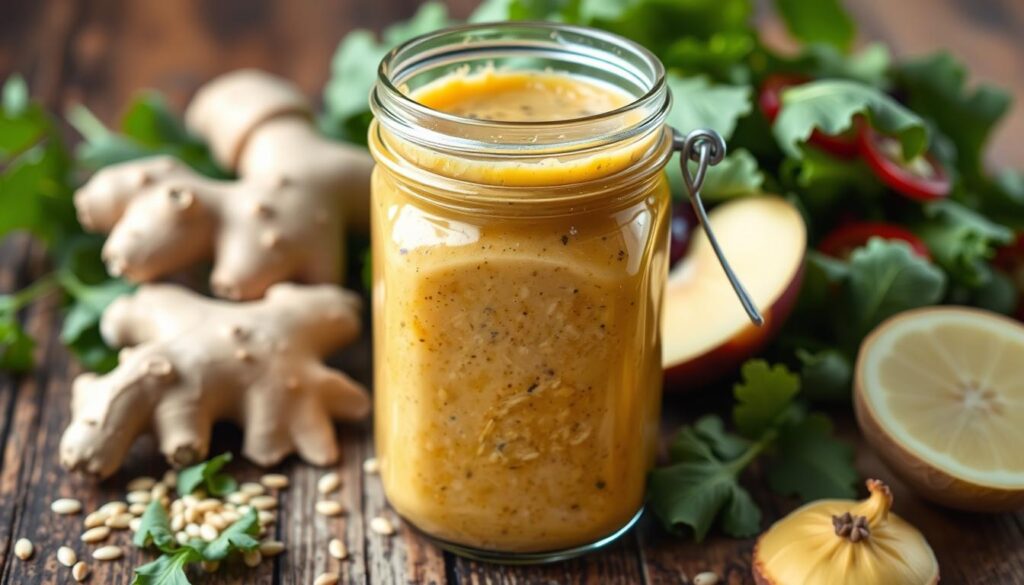
With its tangy and slightly sweet flavor, this Asian-inspired sesame ginger dressing is sure to become a favorite. Try it today and experience the delicious taste of a plant based salad dressing!
| Dressing | Ingredients | Prep Time |
|---|---|---|
| Asian-Inspired Sesame Ginger | Sesame oil, ginger, soy sauce | 10 minutes |
Healthy Green Goddess Dressing
I love creamy and tangy dressings, so I was thrilled to make a healthy version of green goddess dressing. This vegan salad dressing uses natural ingredients and no added oils. It’s perfect for those who want a no oil salad dressing.
To make this dressing, you’ll need a few simple ingredients. Here’s what you’ll need:
- Fresh herbs like parsley, dill, and tarragon
- A squeeze of fresh lemon juice
- A dollop of plain vegan yogurt
- A pinch of salt and pepper to taste
This healthy green goddess dressing is great on mixed greens, roasted veggies, or whole grain crackers. You can also use it as a dip for raw or roasted veggies. Its creamy texture and tangy flavor make it a favorite in any home.
By making your own vegan salad dressing, you control the ingredients. You can avoid added oils and unwanted ingredients. This no oil salad dressing is tasty, healthy, and eco-friendly.
| Ingredient | Quantity |
|---|---|
| Fresh parsley | 1/4 cup |
| Fresh dill | 1/4 cup |
| Fresh tarragon | 1/4 cup |
| Lemon juice | 2 tablespoons |
| Vegan yogurt | 1/2 cup |
Quick and Easy No-Oil Mediterranean Dressing
I’m excited to share a simple, delicious oil-free salad dressing. It’s great for Mediterranean-inspired salads. It’s made with lemon juice, garlic, and herbs, and doesn’t have any added oils.
Mediterranean Herbs to Use
Mediterranean cuisine often uses oregano, thyme, and rosemary. These herbs give the dressing a rich, savory taste. You can use them fresh or dried. Try parsley and basil for a different flavor.
Storage Tips
To keep your dressing fresh, store it in an airtight container in the fridge. Add lemon juice or vinegar on top to prevent spoilage. Here are some tips for storing:
- Store in a glass container with a tight lid
- Keep it in the fridge at 40°F (4°C) or below
- Use it within 5-7 days after opening
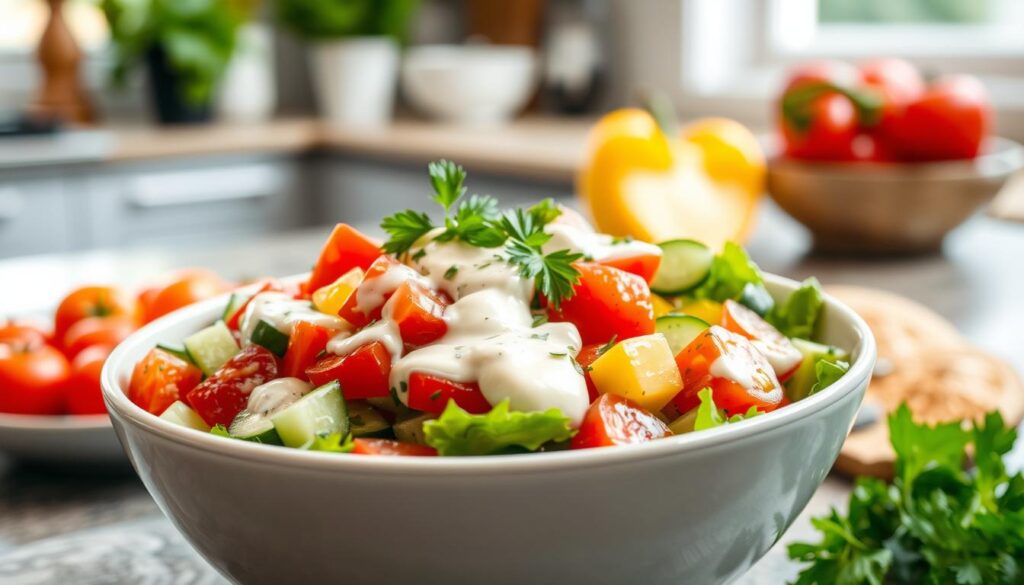
By following these tips, you can enjoy your homemade dressing longer. Try different vegan salad dressing recipes to find your favorite.
Troubleshooting Common Vegan Dressing Issues
When you make your own plant based salad dressing, you might face some common problems. One big issue is when the ingredients don’t mix well. This can happen if you use the wrong oil or forget to add an emulsifier.
Separation Problems
To fix separation issues, try adding an emulsifier like lemon juice or vinegar to your vegetarian salad dressing. You can also mix the ingredients in a different order. Or, use a blender to make sure everything is well mixed.
Texture Concerns
Texture problems are another common issue. If your dressing is too thick, add a bit more water or lemon juice. If it’s too thin, add more oil or an emulsifier.
Flavor Balance
Getting the flavor right is key when making vegan dressings. Adjust the salt, sugar, or spices to taste. You can also try adding different herbs or spices to your plant based salad dressing for more flavor.
Storage and Shelf Life Tips
Keeping homemade salad dressings fresh is key. This includes vegan salad dressing and no oil salad dressing. The right storage containers and simple tips can help.
Here are some tips for storing your homemade salad dressings:
- Use airtight containers to prevent contamination and spoilage.
- Keep the containers in the refrigerator at a temperature of 40°F (4°C) or below.
- Label the containers with the date and contents, so you can easily keep track of how long they’ve been stored.
- Consider freezing your dressings to extend their shelf life. Simply pour the dressing into an ice cube tray, freeze, and then transfer the frozen cubes to a freezer-safe bag or container.
By following these tips, you can enjoy your homemade vegan salad dressing and no oil salad dressing for a longer period. This way, you keep them fresh and of high quality.
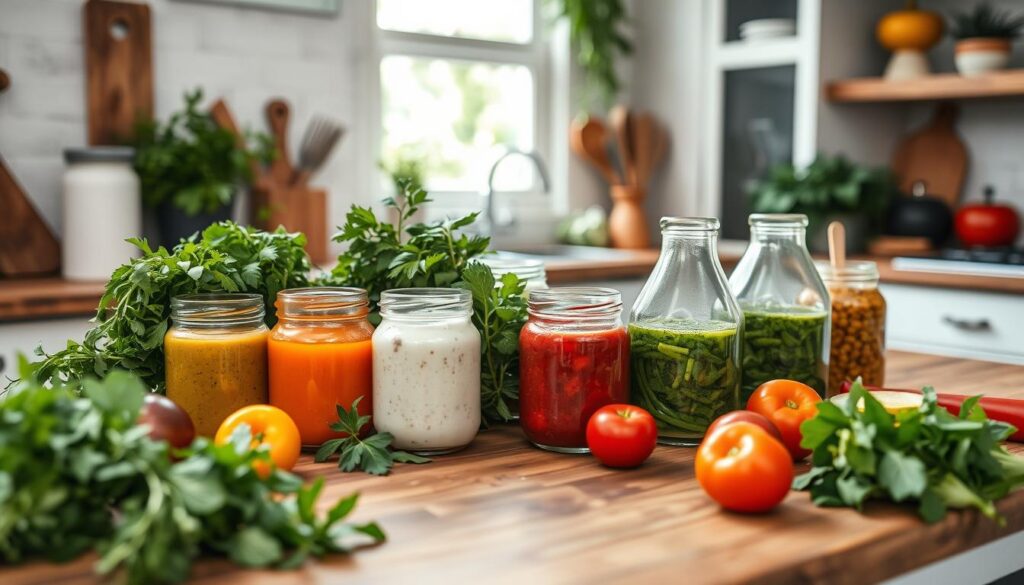
Always check the dressing for any signs of spoilage before consuming it. Look for an off smell or slimy texture. If unsure, it’s best to discard the dressing.
| Dressing Type | Storage Method | Shelf Life |
|---|---|---|
| Vegan Salad Dressing | Refrigeration | 5-7 days |
| No Oil Salad Dressing | Refrigeration | 5-7 days |
| Vegan Salad Dressing | Freezing | 3-6 months |
| No Oil Salad Dressing | Freezing | 3-6 months |
Seasonal Adaptations for Your Dressings
As the seasons change, so do our tastes. In summer, I love using oil free salad dressing for light, refreshing salads. My go-to is a citrus-herb dressing with lemon juice, herbs, and a touch of garlic.
In winter, I crave heartier dressings. A plant based salad dressing with roasted veggies like butternut squash and carrots makes my salads rich and creamy. Here are some seasonal ideas:
- Summer: citrus-herb dressing, berry vinaigrette, or a refreshing cucumber-dill dressing
- Winter: roasted vegetable dressing, warm apple cider vinaigrette, or a creamy cashew-based dressing
Adapting your dressings to the season lets you enjoy delicious, seasonal salads. Whether you like oil free salad dressing or plant based salad dressing, there’s always something new to try.
| Season | Dressing Ideas |
|---|---|
| Summer | Citrus-herb, berry vinaigrette, cucumber-dill |
| Winter | Roasted vegetable, warm apple cider vinaigrette, creamy cashew-based |
Nutritional Benefits of Homemade Vegan Dressings
Many people don’t know the health benefits of vegan salad dressing recipes. Making your own dressings lets you choose the ingredients. This way, you get the most nutritional value from your salads. Homemade vegan dressings can boost your intake of healthy fats, antioxidants, and other key nutrients.
Some key benefits of homemade vegan dressings include:
- Reduced calorie intake: Natural ingredients and no added sugars mean fewer calories in your dressings.
- Increased healthy fats: Ingredients like olive oil, avocado, and nuts are good for your heart and can lower cholesterol.
- More antioxidants: Homemade dressings can have lots of antioxidants from berries, leafy greens, and other fruits and veggies. These help protect cells and reduce inflammation.
Vegetarian salad dressing options can also add nutrition to your meals. By mixing different ingredients and spices, you can make tasty and healthy dressings. These are great for salads, marinades, and more. With a bit of creativity, you can make your own unique vegan salad dressing recipes that are both nutritious and delicious.
Creative Ways to Use Your Dressings Beyond Salads
I’ve found that my homemade vegan salad dressings are great for more than just salads. They’re perfect for marinades, dips, and sandwich spreads. My favorite use is as a marinade for grilled veggies or tofu.
Here are some other creative ways to use your dressings:
- Use your oil free salad dressing as a dip for raw or roasted vegetables
- Spread a layer of your favorite dressing on a sandwich for added flavor
- Mix your dressing with some plant-based yogurt or sour cream for a tasty sauce
Exploring new ways to use your dressings can make your meals more exciting. It’s a great way to enjoy your homemade no oil salad dressing and oil free salad dressing recipes.
With a bit of experimentation, you can unlock a world of flavors for your homemade dressings. So, don’t be afraid to try something new today!
| Usage Idea | Benefits |
|---|---|
| Marinades | Adds flavor to grilled or baked foods |
| Dips | Provides a healthy snack option |
| Sandwich Spreads | Enhances flavor and texture of sandwiches |
Conclusion
Making your own vegan salad dressings is not only easy but also a fun way to enhance your meals. With the right plant-based ingredients, you can create vibrant, healthy salads that are as delicious as they are good for you. This article offers tasty plant-based salad dressing recipes and helpful tips to elevate your salad game.
Whether you’re a seasoned vegan or new to homemade dressings, this guide has something for everyone. Homemade vegan salad dressings add rich flavor and support your well-being, all while being better for the planet.
Let’s embrace the endless possibilities of plant-based salad dressings. They bring flavor and health to your meals, making every bite a celebration of good food.
Reviewed by Koujil Amine, founder of YummyWhirl, and generated by Emma Chef.
